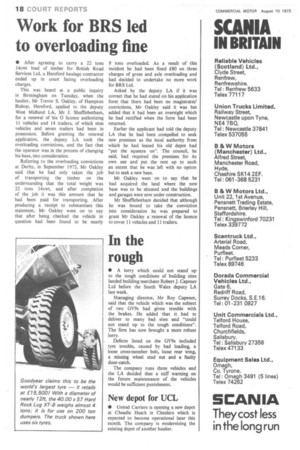Work for BRS led to overloading fine
Page 20

If you've noticed an error in this article please click here to report it so we can fix it.
• After agreeing to carry a 22 tons 14cwt load of timber for British Road Services Ltd, a Hereford haulage contractor ended up in court facing overloading charges.
This was heard at a public inquiry in Birmingham on Tuesday, when the haulier, Mr Trevor S. Oakley, of Hampton Bishop. Hereford, applied to the deputy West Midland LA, Mr J. Shufflebotham, for a renewal of his 0 licence authorizing 11 vehicles and 14 trailers, of which nine vehicles and seven trailers had been in possession. Before granting the renewal application, the deputy LA took the overloading convictions, and the fact that the operator was in the process of changing his base, into consideration.
Referring to the overloading convictions at Derby, in September 1972, Mr Oakley said that he had only taken the job of transporting the timber on the understanding that the total weight was 22 tons 14cwt, and after completion of the job it was this amount that he had been paid for transporting. After producing a receipt to substantiate this statement, Mr Oakley went on to say that after being checked the vehicle in question had been found to be nearly 8 tons overloaded. As a result of this incident he had been fined £80 on three charges of gross and axle overloading and had decided to undertake no more work for BRS Ltd.
Asked by the deputy LA if it was correct that he had stated on his application form that there had been no magistrates' convictions, Mr Oakley said it was but added that it had been an oversight which he had rectified when the form had been returned.
Earlier the applicant had told the deputy LA that he had been compelled to seek new premises as the local authority from which he had leased his old depot had "put the squeeze on". The council, he said, had required the premises for its own use and put the rent up to such an extent that he was left with no option but to seek a new base.
Mr Oakley went on to say that he had acquired the land where the new base was to be situated and the buildings and garages were now under construction.
Mr Shufflebotham decided that although he was bound to take the conviction into consideration he was prepared to grant Mr Oakley a 'renewal of the licence to cover 11 vehicles and 11 trailers.




























































































